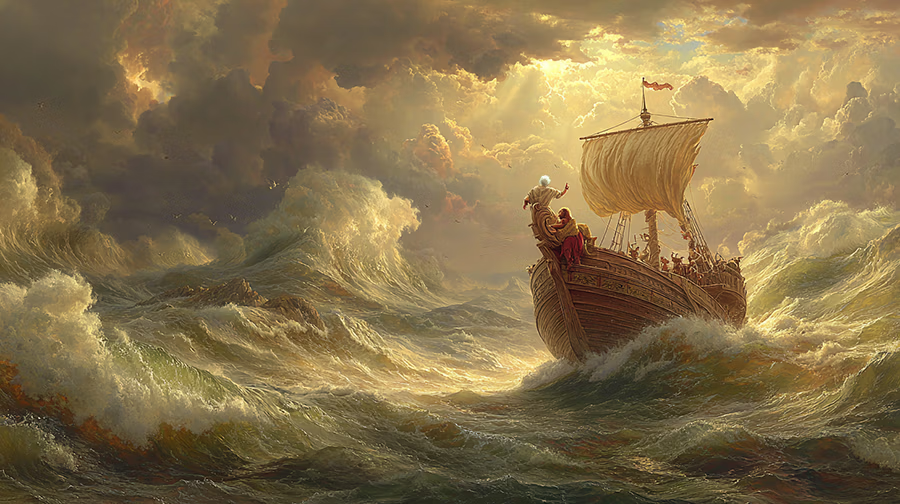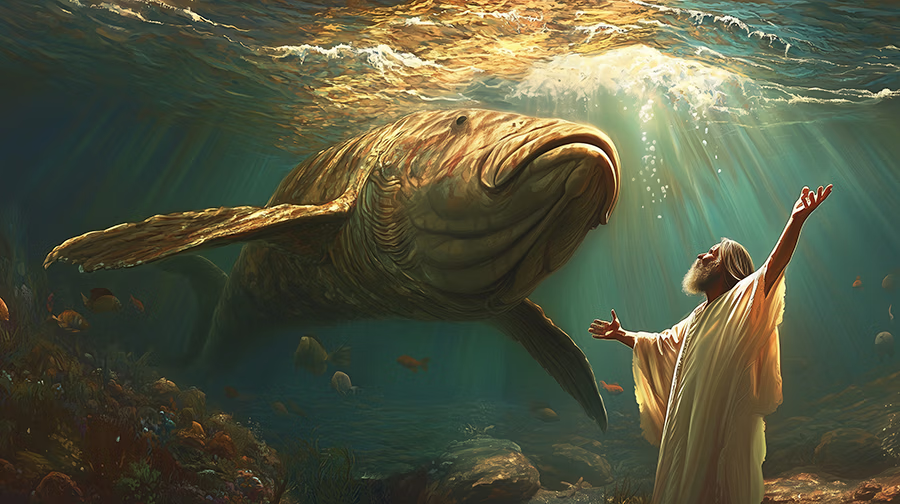
The Book of Jonah 1 reveals one of Scripture’s most compelling stories about a prophet’s rebellion against God’s call and the extraordinary consequences that follow. This ancient narrative speaks directly to modern believers about the futility of running from God’s purposes and the surprising ways divine grace operates even through our disobedience.
Table of Contents
The Historical Context of Jonah’s Call
Understanding Jonah’s Background and Reputation
What do we know about the prophet Jonah from biblical history? Jonah, son of Amittai, was an established prophet of Israel with a proven track record of delivering God’s messages accurately. His name means “dove,” while his father’s name Amittai means “truth,” establishing his credentials as a messenger of divine truth.
The Book of Jonah 1 doesn’t begin with an unknown figure but with a respected prophet who had previously served faithfully. In 2 Kings 14:25, we learn that Jonah had already prophesied successfully about Israel’s territorial restoration under King Jeroboam II:
“He restored the border of Israel from the entrance of Hamath unto the Sea of the Arabah, according to the word of the Lord, the God of Israel, which he spoke by his servant Jonah the son of Amittai, the prophet, who was of Gath-hepher.”
This background makes his subsequent rebellion all the more striking and instructive for believers today.
Jonah’s hometown of Gath-hepher, located in the northern kingdom of Israel, positioned him as someone familiar with both Jewish culture and the broader regional dynamics. His understanding of God’s character through biblical wisdom for daily living made his resistance to the divine call particularly significant. The prophet knew exactly what he was refusing and why.

The Great City of Nineveh: Israel’s Greatest Threat
Why was Nineveh such a significant target for God’s message? Nineveh represented the pinnacle of Assyrian power and brutality, with an 80-mile circumference surrounded by 100-foot walls and 1,500 guard towers rising 200 feet high. This metropolis of 600,000 people embodied everything that threatened Israel’s existence.
The Assyrians were renowned for their artistic achievements alongside their violent paganism. They practiced ritual flaying of enemies and displayed severed heads as trophies of conquest. For a Hebrew prophet, entering Nineveh meant facing not only potential death but also confronting a culture that represented the antithesis of everything sacred to Israel.
Understanding Nineveh’s significance helps us grasp why the Book of Jonah 1 focuses so intensely on the prophet’s resistance. This wasn’t merely about preaching to foreigners; it was about extending God’s mercy to Israel’s most feared enemies. The parallel to modern believers facing calls to minister to those they consider unworthy or threatening becomes remarkably clear.
Jonah’s Shocking Response: Running from the Almighty
The Prophet’s Calculated Rebellion
What motivated Jonah to flee from God’s direct command? The Book of Jonah 1 opens with a clear divine directive that the prophet immediately rejected:
“Now the word of the Lord came to Jonah the son of Amittai saying, ‘Arise, go to Nineveh, that great city, and cry out against it; for their wickedness has come up before Me.’ But Jonah arose to flee to Tarshish from the presence of the Lord.”
Jonah’s decision to run toward Tarshish wasn’t impulsive fear but calculated rebellion rooted in both personal safety concerns and deep-seated prejudice. He understood that God’s compassionate nature would likely lead to Nineveh’s salvation, which threatened his nationalist worldview.
The Book of Jonah 1 reveals two primary motivations for the prophet’s flight. First, he genuinely feared the Ninevites’ brutal response to an unwelcome message. Their practice of flaying prisoners alive made ministry to them literally life-threatening. Second, and perhaps more significantly, Jonah harbored racist attitudes that made him unwilling to see God’s mercy extended to gentiles.
This wasn’t mere cowardice but theological rebellion. Jonah knew from experience that God’s character included abundant mercy and forgiveness. His fear wasn’t that the message would fail, but that it would succeed too well. The salvation of 600,000 Assyrians would challenge Israel’s exclusive claim to God’s favor and potentially threaten their cultural identity through intermarriage and assimilation.
The Geography of Escape: Tarshish as the End of the World
Where exactly was Jonah trying to flee, and what did this destination represent? Tarshish lay approximately 2,500 miles west of Israel, beyond the Strait of Gibraltar, representing the furthest edge of the known world. For ancient peoples, Tarshish marked the boundary between civilization and the unknown void.
The journey to Tarshish required boarding a massive Phoenician freighter in Joppa, Israel’s only major port. These vessels transported grain westward and returned with iron from Spanish smelters, making them among the largest ships of the ancient world. Jonah’s choice to descend into the lowest deck of such a vessel symbolically represented his attempt to hide in the deepest, darkest place imaginable.
The route itself carried symbolic weight in the Book of Jonah 1 narrative. While God called Jonah eastward to Nineveh, the prophet chose to travel westward toward what many believed was the edge of existence. This geographical rebellion reinforced the theological rebellion, as Jonah literally ran toward the ends of the earth to escape divine responsibility.

The Divine Storm: God’s Pursuit of His Reluctant Prophet
When Heaven Intervenes at Sea
How did God respond to Jonah’s attempt to escape his calling? The Lord sent a supernatural tempest that threatened to destroy the Phoenician vessel and everyone aboard:
“But the Lord sent out a great wind on the sea, and there was a mighty tempest on the sea, so that the ship was about to be broken up.”
This wasn’t a natural storm but a divine intervention designed to redirect the fleeing prophet back toward his intended mission.
The experienced Phoenician sailors immediately recognized this storm’s supernatural character. These men had spent their lives reading weather patterns and navigating Mediterranean waters, yet they found themselves facing unprecedented conditions that defied natural explanation. The Book of Jonah 1 emphasizes their terror because their expertise made them uniquely qualified to recognize the storm’s divine origin.
The timing and intensity of the tempest served multiple purposes in God’s plan. It demonstrated the futility of running from divine assignments while simultaneously creating an evangelistic opportunity among the pagan crew. Through God’s providence and divine guidance, what began as judgment for Jonah became blessing for the gentile sailors.
The Irony of the Sleeping Prophet
Why was Jonah sleeping while everyone else feared for their lives? The text reveals a striking contrast between the prophet’s spiritual numbness and the sailors’ desperate awareness:
“Then the mariners were afraid; and every man cried out to his god, and threw the cargo that was in the ship into the sea, to lighten the load. But Jonah had gone down into the lowest parts of the ship, had lain down, and was fast asleep.”
While experienced sailors cried out to their gods and frantically lightened the ship’s cargo, Jonah slept peacefully in the vessel’s lowest compartment. This scene foreshadows Jesus sleeping during the storm on the Sea of Galilee, yet with crucial differences in motivation and character.
Jonah’s sleep represented not divine peace but spiritual numbness. His deliberate rebellion had dulled his sensitivity to both God’s voice and human need. The prophet who should have been interceding for the endangered crew instead remained oblivious to their plight. This spiritual insensitivity often accompanies willful disobedience to divine calling.
The captain’s desperate plea for Jonah to pray revealed the pagans’ greater spiritual awareness than the Hebrew prophet displayed. They understood that multiple deities might need appeasing, while Jonah ignored the very God who could calm the storm. The Book of Jonah 1 uses this irony to highlight how rebellion can make believers less spiritually sensitive than unbelievers seeking truth.
The Revelation: Casting Lots and Confronting Truth
Divine Sovereignty in Random Selection
How did the sailors discover that Jonah was responsible for their peril? The crew resorted to casting lots, a common ancient practice for determining divine will, and God sovereignly guided the result to fall upon Jonah. This method involved drawing straws or sticks of varying lengths, with the shortest indicating the guilty party.
The Book of Jonah 1 demonstrates God’s ability to use seemingly random processes to accomplish his purposes. While the sailors understood lot-casting as a form of divination, God used their cultural practice to reveal truth and redirect attention to his rebellious prophet. This divine intervention through ordinary means reflects how God often works within cultural frameworks to accomplish extraordinary purposes.
The lot falling on Jonah wasn’t coincidental but providential. Through this revelation, God forced the prophet to confront his rebellion publicly while giving the pagan sailors clear evidence of divine involvement in their crisis. The experience would prove foundational for their subsequent conversion to faith in the true God.
Jonah’s Confession and Its Devastating Impact
What did Jonah reveal about himself when confronted by the sailors? The prophet’s confession contained both truth and devastating irony:
“So he said to them, ‘I am a Hebrew; and I fear the Lord, the God of heaven, who made the sea and the dry land.’ Then the men were exceedingly afraid, and said to him, ‘Why have you done this?’ For the men knew that he fled from the presence of the Lord, because he had told them.”
The prophet confessed his identity as a Hebrew who worshiped “the Lord, the God of heaven, who made the sea and the dry land,” while simultaneously admitting his flight from this same God’s presence. This revelation terrified the sailors who suddenly understood they were caught in divine judgment.
Jonah’s confession contained both truth and irony. He accurately described God’s sovereignty over creation while demonstrating his own foolish attempt to escape that very sovereignty. The sailors’ increased fear showed their immediate grasp of what Jonah had failed to fully comprehend: the futility of fleeing from the Creator of all existence.
The prophet’s honesty about his rebellion served multiple purposes in the narrative. It provided the necessary context for understanding the storm’s supernatural origin while establishing the foundation for the sailors’ eventual conversion. Through examining biblical wisdom for daily living, we see how God uses even confessions of failure to advance his redemptive purposes.

The Ultimate Sacrifice: Jonah’s Solution and Its Prophetic Significance
Proposing Death as Deliverance
Why did Jonah tell the sailors to throw him overboard? The prophet understood that his rebellion had caused the supernatural storm and offered himself as the solution:
“And he said to them, ‘Pick me up and throw me into the sea; then the sea will become calm for you. For I know that this great tempest is because of me.'”
The prophet understood that his rebellion had caused the supernatural storm and that his death would restore calm to the sea. This proposal contained both selfish and selfless elements, as Jonah sought to end his torment while potentially saving the crew’s lives.
Jonah’s willingness to die rather than return to his mission revealed the depth of his resistance to God’s call. He preferred drowning to preaching salvation to the Ninevites, demonstrating how prejudice and fear can drive people to extreme choices. Yet his proposal also showed concern for the innocent sailors who suffered because of his disobedience.
The Book of Jonah 1 presents this moment as a foreshadowing of Christ’s sacrificial death for humanity’s salvation. Like Jesus, Jonah offered his life to save others, though with vastly different motivations. While Christ willingly died out of love for sinners, Jonah chose death to escape an unwanted ministry assignment.
The Sailors’ Reluctant Compliance
How did the pagan sailors respond to Jonah’s drastic proposal? Rather than immediately throwing the prophet overboard, the sailors demonstrated remarkable compassion:
“Nevertheless the men rowed hard to return to land, but they could not, for the sea continued to grow more tempestuous against them. Therefore they cried out to the Lord and said, ‘We pray, O Lord, please do not let us perish for this man’s life, and do not charge us with innocent blood; for You, O Lord, have done as it pleased You.'”
Rather than immediately throwing the prophet overboard, the sailors made desperate attempts to reach shore, demonstrating more compassion for Jonah’s life than he showed for the Ninevites. Their reluctance to shed blood revealed moral sensitivity that contrasted sharply with the prophet’s hardheartedness.
When their efforts to reach land failed, the sailors prayed to Jonah’s God, asking not to be held accountable for innocent blood. This prayer showed their growing recognition of divine authority and their desire to act righteously. They had moved from polytheistic desperation to monotheistic supplication in the span of hours.
The crew’s careful handling of Jonah – lifting him up respectfully before placing him in the sea – demonstrated honor even in their extremity. The Book of Jonah 1 uses this detail to highlight the gentiles’ humanity while emphasizing the prophet’s own lack of compassion for those he considered beneath his concern.
The Great Fish: Death, Deliverance, and Divine Preservation
Immediate Calm and Supernatural Rescue
What happened when Jonah hit the water? The immediate result demonstrated God’s complete control over the situation:
“So they picked up Jonah and threw him into the sea, and the sea ceased from its raging. Then the men feared the Lord exceedingly, and offered a sacrifice to the Lord and took vows.”
The sea immediately became calm, providing dramatic proof of the storm’s supernatural origin and divine resolution. This instant transformation convinced the sailors of God’s power and led to their immediate conversion to faith in the Hebrew deity.
God had prepared a great fish to swallow Jonah, preserving the prophet’s life while demonstrating divine sovereignty over all creation:
“Now the Lord had prepared a great fish to swallow Jonah. And Jonah was in the belly of the fish three days and three nights.”
The text specifies a fish rather than a whale, indicating a creature specifically equipped for this unique mission of preservation and transportation. This supernatural intervention showed God’s commitment to his purposes despite human rebellion.
The three days and three nights Jonah spent in the fish’s belly directly prefigured Christ’s death and resurrection. Jesus himself referenced this parallel, identifying Jonah’s experience as a prophetic sign of his own sacrificial death and triumphant return to life. The Book of Jonah 1 thus contains clear messianic foreshadowing alongside its immediate narrative purposes.
The Sailors’ Complete Transformation
How did the pagan crew respond to witnessing God’s power? The sailors feared the Lord exceedingly, offered sacrifices, and made vows of ongoing commitment to the Hebrew God. Their conversion was immediate and complete, transforming them from polytheistic pagans to monotheistic believers in a single day.
This transformation serves as one of Scripture’s most dramatic examples of gentile evangelization. Men who had worshiped multiple deities throughout their lives suddenly recognized the supremacy and exclusivity of Israel’s God. Their response put Jonah’s resistance to shame, as they embraced the very God the prophet was trying to escape.
The sailors’ subsequent sacrifices and vows demonstrated genuine conversion rather than mere crisis-driven superstition. Through connections to other examples of God’s providence and divine guidance, we see how God often uses unexpected circumstances to bring people to saving faith.

Lessons for Modern Believers: Applications from Jonah’s Rebellion
Recognizing Our Own Resistance to Divine Calling
What does Jonah’s story teach contemporary Christians about obedience to God’s call? Every believer faces moments when God’s direction conflicts with personal preferences, cultural expectations, or deeply held prejudices. Jonah’s rebellion illustrates how even mature believers can resist divine assignments when they challenge our comfort zones or worldviews.
The prophet’s experience demonstrates that running from God’s call never leads to peace or fulfillment. Geographic distance cannot create spiritual separation from divine purposes, and attempting to escape responsibility only delays inevitable confrontation with God’s will. Modern believers benefit from understanding that divine assignments, however challenging, ultimately serve both personal growth and kingdom advancement.
Jonah’s prejudice against the Ninevites mirrors contemporary struggles with racial, cultural, or socioeconomic biases that can limit our willingness to minister across demographic boundaries. The Book of Jonah 1 challenges readers to examine their own resistance to reaching those they consider unworthy of grace or threatening to their community’s stability.
Understanding Divine Persistence and Mercy
How does God’s pursuit of Jonah encourage believers facing their own spiritual struggles? God’s relentless pursuit of his rebellious prophet demonstrates divine commitment to redemptive purposes that transcends human failure. The supernatural storm, sovereign lot-casting, and miraculous preservation all reveal God’s determination to accomplish his will through willing or unwilling servants.
Divine mercy appears throughout the narrative, from preserving Jonah’s life despite his rebellion to converting the pagan sailors despite their polytheistic background. God’s grace extends not only to the intended recipients of ministry but also to those who initially resist participating in that ministry. This dual mercy encourages struggling believers while challenging complacent ones.
The story reveals that God’s purposes advance even through human disobedience. While Jonah’s rebellion delayed his mission to Nineveh, it accomplished the unexpected evangelization of Phoenician sailors. Through studying biblical wisdom for daily living, believers learn to trust divine sovereignty even when human failure seems to derail kingdom purposes.
Confronting Modern Prejudices and Fears
How should contemporary Christians apply Jonah’s lessons about prejudice and fear? The prophet’s resistance to ministering to the Ninevites stemmed from both legitimate safety concerns and illegitimate racial prejudice. Modern believers must distinguish between wise caution and sinful discrimination when evaluating ministry opportunities across cultural or ideological boundaries.
Jonah’s fear of Assyrian violence reflected real historical threats, yet his unwillingness to trust God’s protection revealed spiritual immaturity. Contemporary Christians facing dangerous ministry assignments can acknowledge legitimate risks while maintaining faith in divine protection and purpose. The Book of Jonah 1 doesn’t minimize real dangers but emphasizes that divine calling includes divine enabling.
The prophet’s deeper concern about gentile salvation threatening Jewish exclusivity speaks to modern fears about demographic changes, cultural shifts, or theological challenges to established traditions. Believers must examine whether their resistance to certain ministry directions stems from genuine biblical convictions or from prejudices that contradict Scripture’s universal scope.

The Broader Biblical Context: Jonah’s Place in Scripture’s Prophetic Literature
Comparing Jonah with Other Reluctant Servants
How does Jonah’s resistance compare to other biblical figures who initially resisted God’s call? Unlike Moses, who protested his inadequacy but ultimately obeyed, or Jeremiah, who complained but continued ministering, Jonah actively fled from his assignment. His rebellion surpassed typical prophetic reluctance, moving into outright defiance of divine will.
The Book of Jonah 1 stands unique among prophetic literature for its focus on the prophet’s character flaws rather than his message’s content. While other prophetic books emphasize divine oracles and their fulfillment, Jonah’s narrative concentrates on human rebellion and its consequences. This perspective provides valuable insights into the psychology of spiritual resistance.
Jonah’s experience connects to the broader biblical theme of God using unlikely or unwilling servants to accomplish redemptive purposes. From Balaam’s forced blessing of Israel to Paul’s conversion on the Damascus road, Scripture repeatedly demonstrates divine ability to advance kingdom purposes through resistant human instruments.
Prophetic Foreshadowing of Christ’s Ministry
In what ways does Jonah’s story prefigure Jesus Christ’s death and resurrection? Jesus explicitly identified Jonah’s three days in the fish as a sign of his own death and resurrection, making this one of the Old Testament’s clearest messianic prophecies. Both figures experienced death-like states followed by supernatural deliverance for the salvation of others.
The contrast between Jonah’s selfish motivations and Christ’s selfless sacrifice enhances rather than diminishes the prophetic connection. While Jonah chose death to escape unwanted ministry, Jesus chose death to accomplish essential ministry. The parallel emphasizes Christ’s superiority while validating the prophetic nature of Jonah’s experience.
The universal scope of both ministries – Jonah to gentile Nineveh and Jesus to all nations – reinforces the prophetic connection. Both missions challenged Jewish exclusivism and demonstrated God’s heart for all peoples. The Book of Jonah 1 thus prepares readers for the New Testament’s revelation of universal salvation through Christ.
Lessons About Divine Sovereignty and Human Responsibility
What does Jonah’s story teach about the relationship between God’s sovereignty and human choice? The narrative demonstrates that divine purposes ultimately prevail despite human resistance, yet it also shows that individual choices have real consequences for both the chooser and others. God’s sovereignty doesn’t eliminate human responsibility but rather works through it.
Jonah’s rebellion delayed but couldn’t prevent God’s plan for Nineveh’s evangelization. However, his resistance created unnecessary suffering for innocent sailors and prolonged his own spiritual struggle. This balance between divine determination and human accountability appears throughout Scripture and finds clear illustration in the prophet’s experience.
The story encourages believers to align their choices with divine purposes while trusting that God’s ultimate plans will succeed regardless of human cooperation. This perspective provides both humility about human importance and confidence about divine faithfulness, essential elements for mature Christian faith.
Contemporary Applications: Living the Lessons of Jonah Chapter 1
Identifying Modern Nineveh’s in Our Lives
What contemporary situations parallel Jonah’s call to minister to his enemies? Modern believers face equivalent challenges when called to serve those who represent threats to their security, values, or identity. Whether reaching across political divides, racial boundaries, or ideological differences, contemporary Christians encounter their own “Nineveh moments” requiring divine grace to overcome natural resistance.
The principle extends beyond formal ministry to everyday relationships and opportunities for witness. Jonah’s story challenges believers to examine their willingness to share the gospel with difficult neighbors, hostile coworkers, or members of groups they consider threatening or unworthy. The Book of Jonah 1 reveals that our greatest ministry opportunities often involve our greatest personal challenges.
Understanding this application requires honest self-examination about prejudices and fears that might limit our obedience to divine calling. Like Jonah, modern believers must distinguish between legitimate wisdom and sinful discrimination when evaluating cross-cultural or ideologically challenging ministry opportunities.
Building A Constitutional Republic Through Biblical Obedience
How does Jonah’s disobedience relate to the challenges facing constitutional republics today? A constitutional republic depends on citizens who voluntarily submit to lawful authority and extend rights and protections to all members of society, regardless of personal feelings about those individuals. Jonah’s refusal to minister to the Ninevites parallels citizens’ reluctance to protect the rights of those they dislike or fear.
The prophet’s prejudice against gentiles threatened the universal scope of God’s mercy, just as contemporary prejudices can undermine the universal application of constitutional principles. Both scenarios require individuals to transcend personal biases in service of higher purposes – divine will in Jonah’s case, constitutional law in civic life.
Jonah’s eventual obedience (in subsequent chapters) demonstrates the possibility of overcoming destructive prejudices through divine transformation. Similarly, constitutional republics require citizens capable of growth beyond tribal loyalties toward broader commitments to justice and human dignity. The Book of Jonah 1 provides a framework for understanding this necessary character development.
Practical Steps for Spiritual Growth
What specific actions can believers take to avoid Jonah’s mistakes? Regular examination of personal prejudices and fears helps identify potential areas of resistance to divine calling. Believers benefit from honestly assessing their willingness to minister across cultural, racial, or ideological boundaries that make them uncomfortable.
Developing relationships with people from different backgrounds provides natural opportunities to overcome prejudices while building empathy for those outside our immediate community. The sailors’ quick conversion suggests that meaningful contact often breaks down barriers more effectively than theoretical discussions about tolerance or acceptance.
Prayer for specific groups or individuals who trigger negative reactions helps identify and address heart-level resistance to God’s universal love. Through resources like the Books of the Bible study series, believers can develop deeper understanding of Scripture’s consistent call to cross-cultural ministry.

Conclusion: Embracing God’s Heart for All People
The Book of Jonah 1 provides a compelling examination of human resistance to divine calling and the extraordinary measures God employs to accomplish his redemptive purposes. Through Jonah’s rebellion, the supernatural storm, and the sailors’ conversion, we witness both the futility of running from God and the surprising ways divine grace operates even through human disobedience.
The narrative challenges contemporary believers to examine their own prejudices and fears that might limit their obedience to divine assignments, particularly those involving people they consider threatening or unworthy. Like the Phoenician sailors who quickly embraced faith while the Hebrew prophet resisted his calling, we often discover that those we least expect prove most responsive to spiritual truth.
Most significantly, Jonah’s experience foreshadows Christ’s death and resurrection while demonstrating God’s heart for all nations and peoples. The story’s universal scope reminds us that divine love transcends cultural, racial, and ideological boundaries that humans often consider insurmountable. As we face our own “Nineveh moments,” may we respond with greater faith and obedience than Jonah initially displayed, trusting that God’s purposes always include blessing for both the messenger and the recipients of his grace.
Frequently Asked Questions (FAQs)
Is the story of Jonah and the great fish literally true?
Yes, the Book of Jonah 1 presents historical events that should be understood as literally true. Jesus himself referenced Jonah’s experience as a prophetic sign of his own death and resurrection, validating the account’s historical accuracy. While the miraculous elements challenge natural explanation, they demonstrate God’s sovereignty over creation and his commitment to redemptive purposes.
Why did God choose such drastic measures to redirect Jonah?
God’s supernatural intervention through the storm and great fish served multiple purposes beyond simply redirecting his rebellious prophet. These dramatic events accomplished the evangelization of pagan sailors while providing a prophetic foreshadowing of Christ’s death and resurrection. The extreme measures reflected both the importance of Nineveh’s salvation and the depth of Jonah’s resistance.
What can modern Christians learn from the sailors’ quick conversion?
The Phoenician sailors’ immediate response to divine revelation demonstrates that spiritual hunger often exists in unexpected places. Their conversion challenges believers to approach cross-cultural ministry with greater faith and expectancy, recognizing that God may have already prepared hearts among those we consider unlikely candidates for salvation.
How does Jonah’s prejudice apply to contemporary racial and cultural tensions?
Jonah’s resistance to ministering to the Ninevites stemmed from both legitimate safety concerns and illegitimate racial prejudice. Modern believers must distinguish between wise caution and sinful discrimination when evaluating ministry opportunities across cultural boundaries. The story calls us to examine whether our resistance to certain groups stems from biblical convictions or personal prejudices that contradict Scripture’s universal scope.
Further Reading
- Blue Letter Bible – Book of Jonah Commentary – Comprehensive biblical commentary and original language resources
- Got Questions – Book of Jonah – Frequently asked questions about Jonah’s historical accuracy and meaning
- Institute for Creation Research – Jonah and the Great Fish – Scientific analysis of the miraculous preservation account

